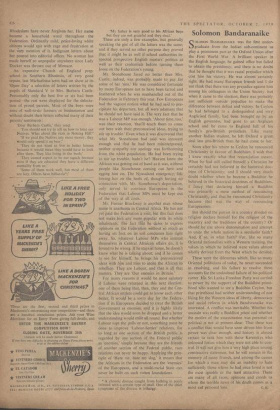Solomon Bandaranaike
OLOMON BANDARANAIKE was the first under-
graduate from the Indian sub-continent to play a prominent part at the Oxford Union after the First World War. A brilliant speaker in the English language, he gained office but failed to obtain the presidency; and there is no doubt that he thought that it was racial prejudice which cost him his victory. He was almost certainly right. He had many European friends and I do not think that there was any prejudice against him among his colleagues in the Union Society; but when it came to the election, there was probably just sufficient outside prejudice to make the difference between defeat and victory. In Ceylon he had belonged to a distinguished and very Anglicised family, had been brought up by an English governess, had gone to an Anglican school and he' came to England full of his family's pro-British prejudices. Like many another Indian student, he left Oxford a great deal less pro-British than he had come to her.
Soon after his return to Ceylon he renounced Christianity in favour of Buddhism. I wish that 1 knew exactly what that renunciation meant. When he had still called himself a Christian he certainly had not believed in the historical doc- trine of Christianity; and I should very much doubt whether when he became a Buddhist he believed in the historical doctrines of Buddhism. I fancy that declaring himself a Buddhist was primarily a mere method of renouncing Christianity. and that he renounced Christianity because that was the way of renouncing Europeanism.
. But should the patriot in a country, divided on religion declare himself for the religion of the majority and the traditions of the country? Or should he rise above denomination and attempt to unite the whole nation in a secularist faith? And, if so, in what faith? For, like so many Oriental nationalists with a Western training, the values in *which he believed were values almost wholly derived from the West which he derided.
These were the dilemmas which, like so many Oriental politicians of today, he never succeeded in resolving, and his failure to resolve them accounts for the undoubted failure of his political career. His Sri Lanka Freedom Party was carried to power by the support of the Buddhist priest- hood who wanted to see a Buddhist Ceylon, but that priesthood had neither understanding of nor liking for the Western ideas of liberty, democracy and social reform in which Bandaranaike was interested. A conflict was inevitable. Whether his assassin was really a Buddhist priest and whether the motive of the assassination was personal or political is not at present clear. That there was a conflict that would have soon driven him froin power was clear mough, and history is almost certain to rank him with those Kerenskys who unloosed forces which they were not able to con- trol. It will not give him a very high place among constructive statesmen, but he will remain in the memory of many friends, and among the causes for which a man may die an inability to hate sufficiently those whom he had once loved is not the most ignoble or the least attractive. There are many Of all races, opinions and creeds to whom the terrible news of his death comes as a
most sad personal loss. c.






































 Previous page
Previous page